Real Queer?
Real Queer?
Sexual Orientation and Gender Identity Refugees in the Canadian Refugee Apparatus
David A. B. Murray
London New York
Published by Rowman & Littlefield International, Ltd.
Unit A, Whitacre Mews, 2634 Stannary Street, London SE11 4AB
www.rowmaninternational.com
Rowman & Littlefield International, Ltd. is an affiliate of Rowman & Littlefield
4501 Forbes Boulevard, Suite 200, Lanham, Maryland 20706, USA
With additional offices in Boulder, New York, Toronto (Canada), and Plymouth (UK)
www.rowman.com
Copyright 2016 by David A.B. Murray
All rights reserved . No part of this book may be reproduced in any form or by any electronic or mechanical means, including information storage and retrieval systems, without written permission from the publisher, except by a reviewer who may quote passages in a review.
British Library Cataloguing in Publication Data
A catalogue record for this book is available from the British Library
ISBN: HB 978-1-78348-439-3
PB 978-1-78348-440-9
Library of Congress Cataloging-in-Publication Data
Murray, David A. B., 1962 author.
Real queer? : sexual orientation and gender identity refugees in the Canadian refugee apparatus / David A.B. Murray.
pages cm
Includes bibliographical references and index.
ISBN 978-1-78348-439-3 (cloth : alk. paper) ISBN 978-1-78348-440-9 (pbk. : alk. paper) ISBN 978-1-78348-441-6 (electronic) 1. Gay immigrantsCanada. 2. RefugeesGovernment policyCanada. 3. Sexual orientation. 4. Gender identity. 5. CanadaEmigration and immigrationGovernment policy. I. Title.
HQ76.3.C2M87 2015
305.30971dc23 2015028262

The paper used in this publication meets the minimum requirements of American National Standard for Information SciencesPermanence of Paper for Printed Library Materials, ANSI/NISO Z39.48-1992.
Printed in the United States of America
Contents
As with all ethnographic endeavours, this book would not exist without the great gifts of time, patience and knowledge from research participants current and former sexual orientation and gender identity refugees now residing in Toronto, Canada; LGBT refugee support group staff and volunteers; refugee lawyers, researchers and scholars; immigration consultants; and staff at the Immigration and Refugee Board (IRB) of Canada. To all of them, my deepest thanks and appreciation. I have done my best to accurately represent conversations and interviews with research participants and to protect the identities of those who generously gave their time to talk with me and/or allowed me to participate in various events and meetings. The opinions and arguments about refugees, the IRB and the refugee apparatus expressed in the following pages are my own and I take full responsibility for them.
My ideas and arguments have benefitted enormously from numerous conversations with scholars, students and friends. In particular, I would like to thank Wenona Giles, Jennifer Hyndman and Susan McGrath for providing important commentary on the genesis of the project and its objectives. I was lucky to have had the opportunity to share my findings and the benefits of feedback with audiences at the Centre for Refugee Studies at York University, The Department of Anthropology at York University, Adelaide University (Australia), Flinders University (Australia), LaTrobe University (Australia), The University of Sydney (Australia) and The University of the West Indies Cave Hill Campus (Barbados). A visiting professorship at Flinders University provided me with time and support to further develop this manuscript. I also benefitted from conversations arising from invited papers presented at the following conferences: The Canadian Association for Refugee and Forced Migration Studies (2012), The Caribbean Studies Association (2012 and 2014), The American Anthropological Association (2011 and 2014), the ).
As this manuscript has gone through various iterations, I have also benefitted greatly from conversations with colleagues and peers including Daphne Winland, Kamala Kempadoo, Ena Dua, Alison Crosby, Naomi Adelson, Zulfikar Hirji, Shubhra Gururani, Melissa Autumn White, Lynda Mannik, Charmaine Crawford, Aaron Kamugisha, Halimah DeShong, Fatimah Jackson, Beverly Hinds, Andy Taitt, Akim Ade Larcher, Barbara Baird, Megan Warin, Steven Angelides, Gaynor Macdonald, Ryan Schram, Joan Atlin, Ashleigh Currier, Erin Durban, Nadia Ellis, Anita Fabos, Cynthia Wright, Nancy Nichol and George Paul Mieu. A number of former and current students provided significant assistance and/or feedback at various stages of development of this manuscript. Thank you to Michael Connors Jackman, Jillian Ollivierre, Danielle Cooper, Tamara de Szegheo Lang, Weronika Rogula, Joseph Wickenhauser, Eda Farsakoglu and Sahithi Tirumareddy.
I would like to thank the Social Sciences and Humanities Research Council of Canada for funding this research project through a Standard Grant from 2011 to 2014. The grant was administered through the Centre for Refugee Studies at York University, where I received an enormous amount of support from the coordinator, Michele Millard, former director Susan McGrath and current director Jennifer Hyndman. Thanks also to my home faculty, the Faculty of Liberal Arts and Professional Studies at York University, for providing additional funding in support of this projects completion, and to Colleen Robinson in the Department of Anthropology for administrative support.
The staff at Rowman and Littlefield International have been a joy to work with throughout the manuscripts development. I would like to thank Martina OSullivan, senior commissioning editor, for taking an interest in this project and shepherding it through the approval process. Thanks also to Sinead Murphy for her helpful and prompt assistance throughout the publishing process.
Last and certainly not least, I say thank you to my circle of friends and family who have supported me through lifes ups and downs before, during and (hopefully) after this project: Much love to Mum and Dad, Alison, Tammy, Leslie, Joan, Lynne, Jen, Sher, Alison C, Naomi, Dan, Heather, Dave, Felipe and Eddie Hassan Murlin (the cat).
On a wintry evening in December 2006, while volunteering at a Toronto lesbian, gay, bisexual and transgender (LGBT) helpline (a free phone service providing referrals, information, and counselling), Edward, another volunteer, and I started to chat. Edward had recently joined the phone line and was still in training, and I was supposed to be mentoring him as I had been working there a few years. It was a slow night with very few calls, so our conversation veered away from training topics to more personal questions, like why we had joined the phone line. I told Edward that I had always wished there was a phone service like this when I was younger and I liked talking on the phone, so thats why I had joined. Edwards answer took me by surprise: He said he had been told by his lawyer to join an LGBT organization to get some experience in the LGBT community. Seeing my look of confusion, Edward went on to say that he had arrived in Toronto a few months ago from Uganda, and had lodged a claim with the Immigration and Refugee Board of Canada (IRB) for refugee status based on sexual orientation persecution.
Edward was a member of a Ugandan group campaigning against LGBT discrimination in Kampala, but over the past year, harassment and death threats from various sectors, including the police, had increased. He had recently bought a plane ticket for The International Conference on LGBT Human Rights in Montreal, and he had heard through his organization that Canada was a place he could seek protection, so he decided he would look into this although he didnt know how or where to start, he planned to ask around at the conference. However, upon exiting Trudeau airport in Montreal, Edward had a confusing conversation with a taxi driver who didnt speak much English: When he asked the driver for directions to the LGBT conference location, the driver told him that the conference was in Toronto (this was partially true: there was an international HIV/AIDS conference taking place in Toronto in a few weeks). Edward didnt know Canadian geography and thought Toronto might be close to Montreal, so he asked the taxi driver to take him there. The taxi driver took him to the train station at Dorval, pointed to the tracks, and said Toronto. Confused, Edward bought a train ticket and five hours later arrived at Torontos Union Station. He started to ask people for the location of the LGBT rights conference, but everyone ignored him. Finally, he encountered a friendly black man who told him he must be talking about the upcoming HIV/AIDS conference. Edward wasnt sure of anything at this point, so he said yes, and asked the man if he could help him find protection and accommodation. The man said he knew a place that allowed people like me to stay. He took Edward to a mens shelter, where they gave him a room and the next day told him to go to an office, where he met a lawyer and told him he needed protection. The lawyer informed Edward that he would need to file for refugee status, and that he would help Edward prepare his claim and provide counsel at a hearing, where he would be asked questions and his case would be assessed by a member of the IRB. Edwards lawyer also told him that he would fare better at the hearing if he joined some LGBT organizations in Toronto, which would strengthen his claim by showing the Board member that he was an active member of the LGBT community. I started to ask Edward more questions, as I didnt fully understand the connection between his claim for refugee status and demonstrating active participation in Torontos LGBT community, but the phones started to ring, and after that night I never saw Edward again the phone line shut down a few months later because of lack of funding.


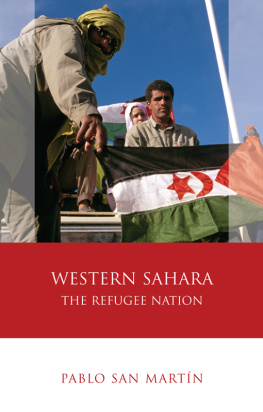
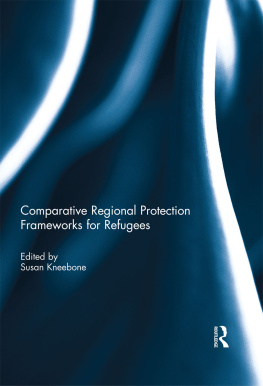
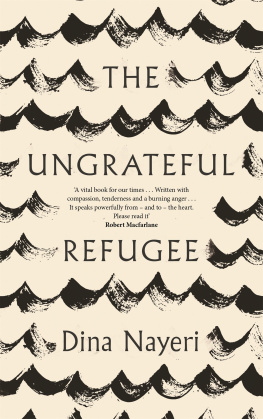
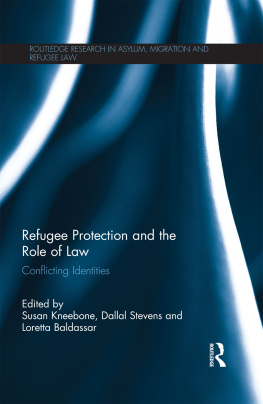
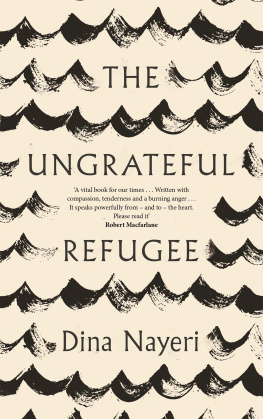
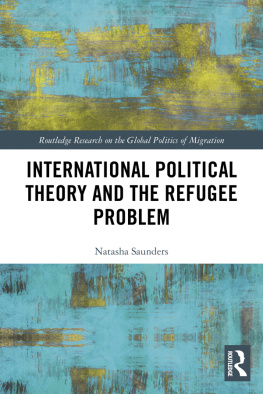

 The paper used in this publication meets the minimum requirements of American National Standard for Information SciencesPermanence of Paper for Printed Library Materials, ANSI/NISO Z39.48-1992.
The paper used in this publication meets the minimum requirements of American National Standard for Information SciencesPermanence of Paper for Printed Library Materials, ANSI/NISO Z39.48-1992.